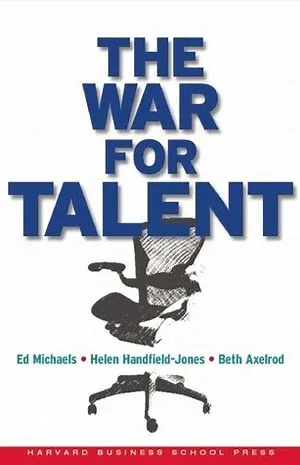How to Win the Talent War
In This Issue
- How to Win the Talent War: Build a Culture of Belonging
- Performance Management Must Change: A Gallop Message
- Where to Find Solutions
- Access to Past Issues in the Archives
How to Win the Talent War: Build a Culture of Belonging
The competition for top talent is fiercer today than ever. In today's tight labor market, it’s not just about paying more to attract extraordinary talent but it's more about retaining them. According to a recent McKinsey & Company survey, the top five reasons employees gave for changing jobs are . . .
- Inadequate compensation,
- Lack of career development,
- Uncaring or uninspiring leaders,
- Lack of meaningful work, and
- Unsustainable work performance expectations.
This underlines the importance of providing an environment where employees can grow, develop, and feel valued.

This is not new news. In 1997, a groundbreaking McKinsey study exposed the "war for talent" as a strategic business challenge and a critical driver of corporate performance. Then, when the dot-com bubble burst and the economy cooled, many assumed the war for talent was over. It's not.
In 2001, the authors of the original study reveal that, because of enduring economic and social forces, the war for talent will persist for the next two decades. It is now 2023 and the problem is worse. [italics mine]. McKinsey & Company consultants Ed Michaels, Helen Handfield-Jones, and Beth Axelrod argue that winning the war for leadership talent is about much more than frenzied recruiting tactics.
It's about the timeless principles of attracting, developing, and retaining highly talented managers - applied in bold new ways [emphasis mine]. And it's about recognizing the strategic importance of human capital because of the enormous value that better talent creates.
Here are my recommendations for the top three strategies for attracting and retaining top talent and creating a loyal, fully engaged workforce AND their managers
1. Prioritize Employee and Management Development
Employees, especially high potentials, crave career development and growth opportunities. Invest in their professional growth and provide them with the necessary training and development programs to equip them with the skills they need to take on more challenging roles and responsibilities. Creating career paths, job rotation, and mentoring programs so they can clearly see a future in the organization is essential for their long-term success.
2. Foster a Positive Work Culture
A positive work culture is essential in retaining top talent. Talented employees want to feel they belong to an organization that reflects their values and creates a sense of community and purpose. Offer a work environment that promotes open communication, collaboration, and teamwork. Include employee recognition programs that recognize and reward outstanding performance and make them feel their contributions are valued.
3. Strengthen Leadership
Strong leadership is vital to retain top talent. Provide leadership development programs that enable leaders at all levels to inspire, motivate, and more effectively engage their team. Leaders who care and invest in the professional growth of their team members foster a more people-friendly culture that encourages loyalty and improves job satisfaction.
Conclusion
Retaining top talent is not an easy task, but it's essential to building a successful, thriving organization. The essentials include prioritizing employee and team leader development, offering competitive compensation, fostering a positive workplace that provides employee well-being and support. Creating a highly engaged workforce also requires strong leadership that supports employees’ professional and personal lives. By investing in your employees and their managers, you demonstrate that you care about their well-being which can accelerate profitable growth.
As a business owner or executive, you hold the reins of your organization's destiny. By embracing a visionary mindset and implementing these strategies, you can position your enterprise for long-term success. Remember, success is not a destination but a journey of continuous improvement and adaptation. Stay ahead of the curve, inspire your team, and relentlessly pursue excellence. Embrace the challenges, seize the opportunities, and build a legacy that can withstand the test of time.
Performance Management Must Change: A Gallop Message
An Article in the April 17, 2023 issue of Gallop @Work was titled, “The Workplace Has Changed, Has Your Performance Management System?”
The following is adapted from Culture Shock, Gallup’s new book about the biggest leadership challenge of our time. For more insights, preorder your copy of Culture Shock.
Traditional performance management systems are set up to rate and rank employees, focusing primarily on their weaknesses.
With the rise of the Industrial Revolution bringing processes that enhanced production efficiency, there were good reasons to focus on weaknesses. Leaders were simply using one of human nature’s greatest strengths -- brains hardwired to critique and find fault. Identifying errors has been critical in environments where defect reduction is paramount, particularly in settings where lives and safety are at stake.
But focusing on weaknesses does not improve employee performance. Just 19% of employees strongly agree that this approach motivates them to do outstanding work.
That’s because while we may be naturally wired to give criticism, we sure aren’t wired to receive it. We crave praise any time we can get it, and constant criticism makes it nearly impossible for a manager and employee to build a trusting relationship. This is especially true in workplaces with much more remote work where managers and their teams have fewer opportunities to build bonds in person.
Where to Find Solutions
Savvy business owners and executives understand the value of employees with highly developed essential skills. The April 2023 Forbes magazine reported a list of essential skills that companies value the most and why.
How do you develop Essential Skills?
Click on the link below to see the list of essential skills and consider the
Cost-effective Solutions That Can Develop Them:
Click Here to Learn about Effectiveness Solutions
